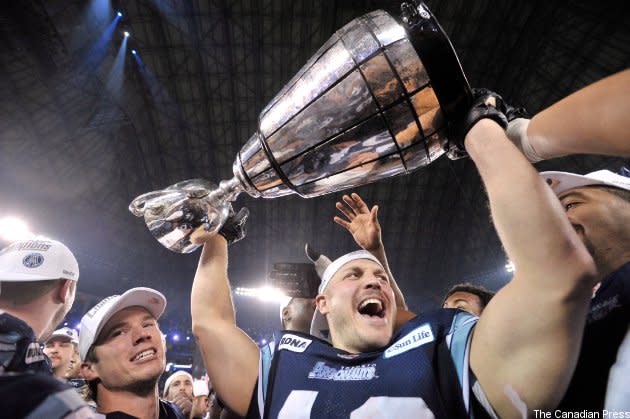Argos sign extension for up to five years at Rogers Centre, which provides a definite exit date
The most crucial element of the extension the Toronto Argonauts signed Friday to continue playing at the Rogers Centre may be the ways it can end. The deal allows the Argonauts to play at the Rogers Centre through December 31, 2017, but they have an option to leave earlier. This isn't unexpected: Blue Jays' president Paul Beeston said this spring that the team wants to bring in real grass within five years, which would necessitate the Argonauts' departure. Moreover, Rogers Centre is a problematic venue for the Argonauts on several fronts from scheduling to environment, and the team has been trying to find an alternative for almost a decade. While this deal gives them some more time to do it, its main impact is to put the deadline in writing: the Argos will have to leave the Rogers Centre before the 2018 season.
Where's the team going to go from there? Well, the possibility of putting them in BMO Field with Toronto FC has attracted a lot of ink recently, but that's a highly unlikely prospect thanks to the substantial opposition to getting rid of the grass there from TFC fans, some local politicians and particularly the Canadian Soccer Association. (Keeping the grass and having both teams play there doesn't really work either, as gridiron football tends to damage grass enough that it's unsuitable for other sports, which is why the team has to leave the Rogers Centre before the Jays can convert it. It's notable that every MLS stadium shared with another sport (the ones in Vancouver, Seattle, Portland and New England) has either FieldTurf or a Polytan surface, while the 15 soccer-specific stadiums in MLS are all grass.
Grass is particularly desirable for attracting international players and teams, which is why the CSA's stance here will matter. It's also notable that MLSE president Tim Leiweke, who said the Argos could potentially use BMO Field earlier this month, has since backtracked and emphasized the importance of grass. Here's what he said Friday at a press conference announcing TFC's new GM:
Artificial turf will not replace the natural grass playing surface at BMO Field, Toronto's soccer-specific lakefront stadium, according to Maple Leaf Sports & Entertainment's chief executive, who conceded his company was nonetheless "obligated" to entertain talk of potentially sharing that stadium with a Canadian Football League team.
Tim Leiweke, who joined MLSE earlier this year, said natural grass is required to make the company's soccer team, Toronto FC, attractive to elite players. Those players, he said, would not join a team that plays on artificial turf.
"We're going to stick to grass," Leiweke said. "No matter what decisions are made going forward, and who plays here, we have to play on grass, or else we're not going to get the [elite players]."
Leiweke does make the point that BMO Field is a city-owned stadium, but it seems highly unlikely that the city's going to pressure TFC to get rid of the grass (which was only recently put in at substantial expense) over vociferous objections from soccer fans and the CSA. Thus, the Argonauts may have to consider other solutions. (They should be doing so anyway, as they'd still be second-class tenants in any BMO Field arrangement.) The most likely answer seems to be a new facility for the Argonauts alone. Getting that won't be easy, but they do have the mayor on their side, and they could have substantial private pockets to work with as well if the discussion of MLSE buying the Argonauts comes to pass. This Rogers Centre extension means the Argos don't have to panic on a new stadium, but they do have to get seriously working on it. There's now a clear deadline, and the clock is ticking.

 Yahoo Sports
Yahoo Sports 


